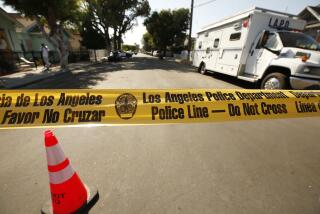State Forms Anti-Terrorism Information-Sharing Center
- Share via
SACRAMENTO — Joined by more than a dozen of the state’s top law enforcement officials, Gov. Gray Davis and state Atty. Gen. Bill Lockyer on Tuesday announced the creation of a new statewide information clearinghouse that will collect and disseminate timely police data on possible terrorist activity.
The California Anti-Terrorism Information Center will gather reports and tips from local authorities from San Diego to Eureka, and make that information available to other law enforcement agencies, much the way police departments share information on gangs and other criminal enterprises.
Los Angeles County Sheriff Lee Baca will serve as chairman of a 14-member board that will oversee the program. California Highway Patrol Commissioner D.O. “Spike” Helmick will be the governor’s liaison.
Although local police usually share any information on suspected terrorist activity with the FBI, they often fail to share it with one another. In fact, Davis said, San Jose police recently uncovered maps and other plans they believed to be part of a terrorist plot, but only shared them with the FBI, not their neighbors.
“In the battle against terrorism, there is no more critical weapon than to have credible information,” Davis said. Terrorists “move around; their routes are very circuitous,” he added, and said local police will have to use teamwork to thread together clues to catch them.
The center represents California’s response to a public plea by U.S. Atty. Gen. John Ashcroft for states to toughen up their information-gathering operations by forming regional task forces in the aftermath of the Sept. 11 terrorist attacks in New York and on the Pentagon. It also represents a recognition by state leaders that California is considered an attractive target for future terrorist acts.
“We’re all acutely aware that the intelligence, immigration and information system broke down,” allowing the terrorist strikes to occur, Lockyer said.
Intelligence officials will be assigned to the Western States Information Network headquarters and the California Bureau of Investigation’s intelligence program in Sacramento, as well as the San Diego Narcotic Information Network and the Los Angeles County Regional Criminal Intelligence Clearinghouse. Other officials will serve as intelligence experts for the various parts of the state.
The center is expected to cost $1.2 million in the first six months and $3.3 million a year after that to keep it operating. It will be part of the information clearinghouse the state already runs on drugs and other suspected criminal activities.
But like the gang database and other efforts, the terrorism clearinghouse is bound to raise questions about whether it violates the civil liberties of the individuals whose information will be distributed to authorities.
Lockyer and Davis stressed that civil liberties will be strongly protected, and that the only type of information that will be shared is data on suspected criminal activity. Furthermore, intelligence officials will examine the locals’ information to ensure they are not unfairly spreading rumor or innuendo.
Though terrorists may strike in one region, Baca said, they will often plot their moves in another, making it crucial that police everywhere work together.
“Clearly, when we look back at past tragedies such as the Oklahoma City bombing,” Baca said, referring to the 1995 domestic terrorist act that killed 168 people, “it was a patrol officer on a [country] road that captured Timothy McVeigh.”
More to Read
Get the L.A. Times Politics newsletter
Deeply reported insights into legislation, politics and policy from Sacramento, Washington and beyond. In your inbox twice per week.
You may occasionally receive promotional content from the Los Angeles Times.










